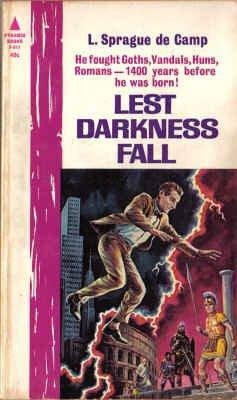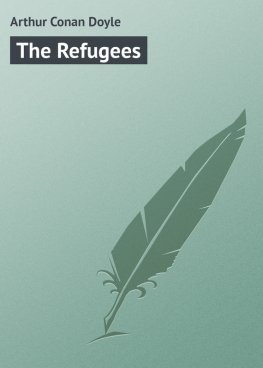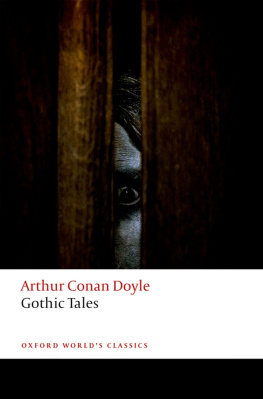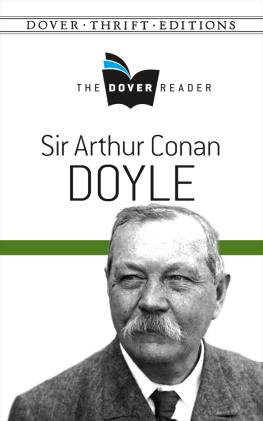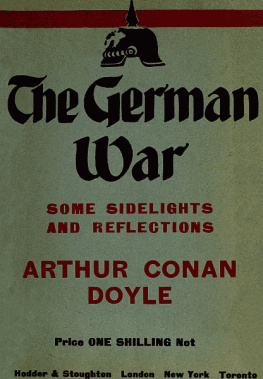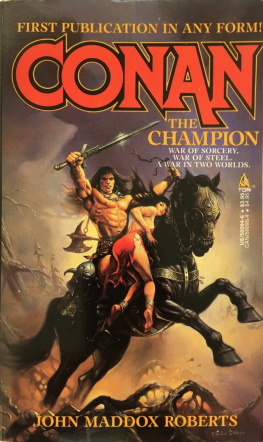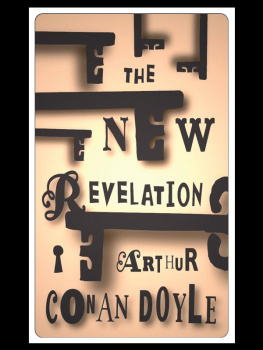L. Camp - Conan Of The Isles
Here you can read online L. Camp - Conan Of The Isles full text of the book (entire story) in english for free. Download pdf and epub, get meaning, cover and reviews about this ebook. year: 0101, genre: History. Description of the work, (preface) as well as reviews are available. Best literature library LitArk.com created for fans of good reading and offers a wide selection of genres:
Romance novel
Science fiction
Adventure
Detective
Science
History
Home and family
Prose
Art
Politics
Computer
Non-fiction
Religion
Business
Children
Humor
Choose a favorite category and find really read worthwhile books. Enjoy immersion in the world of imagination, feel the emotions of the characters or learn something new for yourself, make an fascinating discovery.

Conan Of The Isles: summary, description and annotation
We offer to read an annotation, description, summary or preface (depends on what the author of the book "Conan Of The Isles" wrote himself). If you haven't found the necessary information about the book — write in the comments, we will try to find it.
Conan Of The Isles — read online for free the complete book (whole text) full work
Below is the text of the book, divided by pages. System saving the place of the last page read, allows you to conveniently read the book "Conan Of The Isles" online for free, without having to search again every time where you left off. Put a bookmark, and you can go to the page where you finished reading at any time.
Font size:
Interval:
Bookmark:
INTRODUCTION
There is a kind of story laid, not in the world as it is or was, but as - to an armchair adventurer - it ought to have been. It is an adventure-fantasy, laid in an imaginary prehistoric or medieval world, where magic works and the scientific revolution has not taken place. Or perhaps it is in some parallel universe, or in this world as it will be in the distant future, when science has been forgotten and magic has revived.
In such a world, gleaming cities raise their shining spires against the stars; sorcerers cast sinister spells from subterranean lairs; baleful spirits stalk crumbling ruins; primeval monsters crash through jungle thickets; and .the fate of kingdoms is balanced on bloody broadswords brandished by heroes of preternatural might and valor. In such a world, men are mighty, women are beautiful, life is adventurous, and problems are simple. Nobody even mentions the income tax or the dropout problem or socialized medicine. Such a story is called 'heroic fantasy' or, sometimes, 'sword-and-sorcery.'
The purpose of heroic fantasy is neither to solve the problems of the steel industry, nor to expose defects in the foreign-aid program, nor to expound the questions of poverty or intergroup hostility. It is to entertain. It is escape reading in which one escapes clear out of the real universe. But, come to think, these tales are no more 'unreal' than the many whodunnits wherein, after the stupid police have fallen over their own big feet, the brilliant amateur - a private detective, a newspaper reporter., or a little old lady - steps in and solves the crime.
Heroic fantasies combine the color, gore., and lively action of the costume novel with the atavistic terrors and delights of the fairy tale. They furnish the purest fun to be found in fiction today. If you read for fun, this is the genre for you.
The heroic fantasy traces its ancestry back to the myths and epics of ancient times - to the stories of Odysseus and Rustam and Sigurd and Cuchulainn. Down the centuries, many civilized writers like Ovid, Firdausi, Geoffrey of Monmouth, Spenser, and James Stephens have collected these tales, edited or rewritten them, and composed pastiches based upon them.
During the seventeenth and eighteenth centuries, stories of the supernatural were neglected in Europe. Then, however, fantasy re-entered the main stream of Western literature through three channels: the oriental fantasy narrative, which first appeared in the form of Galland's translation into French of the Arabian Nights; the Gothic novel, brought from Germany to England by Horace Wai-pole with his Castle of Otranto (1764); and the child's fairy tale, originally based upon the peasant tales written up and popularized by Andersen and the Grimm brothers.
At the same time, Walter Scott launched the modern historical novel with his Waverley (1814) and its many successors. Although people had long written stories laid in periods before their own - Homer's Iliad is an obvious example - Scott was the first to realize that the past had been drastically different in many ways from the present and that these differences of costume and custom in themselves had entertainment value, which a skilled storyteller could exploit. Scott's novels were so influential that they touched off a wave of British medieval romanticism.
In the 1880s, William Morris, the versatile British artist, decorator, poet, reformer, publisher, and novelist, created the modern heroic fantasy. In his pseudo-medieval novels like The Well at the World's End, Morris combined the antiquarian romanticism of Scott and his imitators with the supernaturalism of Walpole and his imitators. After Morris, Lord Dunsany adapted heroic fantasy to the short-story form early in the present century, while Eric R. Eddison composed his long Zimiamvian novels in the same genre.
The appearance of the American magazines Weird Tales in 1923 and Unknown Worlds in 1939 created new markets for heroic fantasy. Many notable tales of swordplay and sorcery appeared in them - notably those of Clark Ashton Smith, Robert E. Howard, C. L. Moore, Henry Kuttner, L. Ron Hubbard, and Fritz Leiber. The market for such fiction shrank after these magazines ceased publication (in 1943 and 1953 respectively) and it looked for a while as if heroic fantasy had become a casualty of the machine age.
Certain trends of the time in mainstream fiction were against heroic fantasy. These included the vogue for stories presenting a strongly subjective, sentimental, or psychological view; stories about an anti-hero - a dull, pathetic little twerp who could do nothing right; stories concealing their lack of an interesting narrative by a pyrotechnic display of stylistic eccentricities; and stories with an intense and absorbing interest in contemporary politics or in sex, especially in its more bizarre manifestations. A lecturer lately has said that, if a fiction writer wants sales, he should write exclusively either about politics or about sex. (A novel called The President's Boyfriend ought to be a lead-pipe cinch.)
There are still, however, many readers who read, not to be enlightened, improved, uplifted, reformed, baffled by the writer's obscurity, amazed by his cleverness, nauseated by his scatology, or reduced to tears by the plight of some mistreated person, class, or caste, but to be entertained. To please such readers^ heroic fantasy has been revived in recent years. The first sign of this revival was the surprising success of J. R. R. Tolkien's trilogy. The Lord of the Rings., which appeared in the middle 1950s.
Of course, to enjoy heroic fantasy, one needs some slight imagination. One must be able to suspend one's disbelief in ghoulies and ghosties and other denizens of the worlds of fantasy. If, however, the reader can believe in international spies who race about in superpowered cars from one posh gambling joint to another and find a beautiful babe awaiting them in bed at each stops a few dragons and demons ought not to daunt him.
Of all the stalwart heroes of heroic fantasy, the most vigorous, virile, brawny, and mettlesome is Conan the Cimmerian. Conan was the invention of Robert E. Howard (1906-36). Howard was born in Peaster, Texas, and lived most of his life in Cross Plains, in the center of Texas. During his last decade, he turned out a large volume of what was then called 'pulp fiction' - sport, detective, western, historical, adventure, weird., and ghost stories, as well as his poetry and his many fantasies. He was influenced by Edgar Rice Burroughs, Robert W. Chambers, Harold Lamb, Jack London, H. P. Lovecraft, Talbot Mundy, and Sax Rohmer among others. At the age of thirty, he ended a promising literary career by suicide.
Although he had his faults as a writer, Howard was a natural storyteller, whose narratives are unmatched for vivid, gripping, headlong action. His heroes - King Kull, Conan, Bran Mak Mora, Solomon Kane - are larger than life: men of mighty thews., hot passions, and indomitable will, who easily dominate the stories through which they stride. In fiction, the difference between a writer who is a natural storyteller and one who is not is like the difference between a boat that will float and one that will not. If the writer has this quality, we can forgive many other faults; if not, no other virtue can make up for the lack, any more than gleaming paint and sparkling brass on a boat make up for the fact that it will not float.
Howard wrote several series of heroic fantasies, most of them published in Weird Tales. Of these, the longest single series comprised the Conan stories, which have also proved the most popular. In reading the Conan stories, one gets the illusion that one is listening to the mighty adventurer himself, sitting before a fire and reeling off tales of his exploits.
Eighteen Conan tales, from a 3,000-word short story to a 66,000-word novel, were published in Howard's lifetime. Eight others, from complete manuscripts to mere fragments and outlines, have been discovered among Howard's papers since 1950.
Next pageFont size:
Interval:
Bookmark:
Similar books «Conan Of The Isles»
Look at similar books to Conan Of The Isles. We have selected literature similar in name and meaning in the hope of providing readers with more options to find new, interesting, not yet read works.
Discussion, reviews of the book Conan Of The Isles and just readers' own opinions. Leave your comments, write what you think about the work, its meaning or the main characters. Specify what exactly you liked and what you didn't like, and why you think so.

